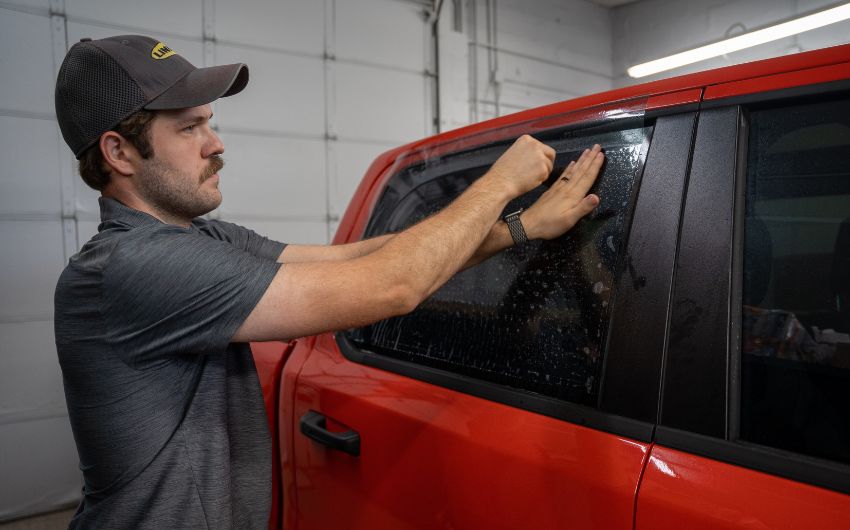Leading Reasons to Pick Expert Auto Window Tinting Providers
Leading Reasons to Pick Expert Auto Window Tinting Providers
Blog Article
Home Window Tinting Laws and Guidelines: What You Required to Know Before Tinting Your Auto
Prior to waging home window tinting for your lorry, it is necessary to acquaint on your own with the varied laws and guidelines that regulate this technique across various states. These guidelines dictate the permitted degrees of tint darkness, often measured by visible light transmission (VLT) portions, and include particular stipulations for front windscreens focused on making certain road safety and security. Additionally, certain jurisdictions might offer clinical exceptions for individuals with certifying problems. Recognizing these intricacies can save you from prospective legal implications, yet what are the particular guidelines in your state?
Review of Home Window Tinting Laws
Home window tinting regulations are often subject to variation across different territories, reflecting local laws and safety factors to consider. These legislations dictate the permitted degrees of color darkness and reflectiveness on lorry home windows, making certain that drivers preserve ample visibility while additionally protecting versus damaging UV rays and warm.
Most policies categorize home window tinting based on the Visible Light Transmission (VLT) percentage, which shows the amount of light that can travel through the window. Typically, lower VLT percents signify darker colors. Regulations commonly distinguish between the front, side, and rear home windows, with more stringent limitations applied to the front windscreen to enhance safety and security for both the driver and other roadway users.
Conformity with home window tinting laws is important, as infractions can result in penalties, mandatory elimination of the tint, and potential rises in insurance premiums. It is important for automobile proprietors to familiarize themselves with regional laws before proceeding with home window tinting setups.
State-by-State Color Laws
Comprehending the particular window tinting regulations in each state is crucial for vehicle proprietors seeking to comply with the legislation. Each state in the united state has actually developed its own set of rules regulating home window tinting, which can vary significantly. These regulations typically determine the allowed degrees of tint darkness, the types of windows that can be tinted, and any type of medical exemptions that may use.
For circumstances, states like The golden state have stringent restrictions on color darkness for front home windows, while others, such as New Mexico, might permit darker colors. Additionally, specific states mandate details exposure percentages for various windows, including the windscreen, front side home windows, and back windows. It is critical for cars and truck owners to acquaint themselves with their state's legislations to avoid potential fines or charges.
Additionally, some states might require a qualification sticker to be positioned on tinted windows, indicating conformity with state legislations. Failure to abide by these regulations not just risks legal repercussions however can likewise impact safety and security and presence while driving. Vehicle proprietors must carry out complete study or consult neighborhood authorities to make sure complete understanding and compliance with state-by-state color laws.
Allowed Color Degrees and Kinds
Several automobile proprietors might be stunned to learn that allowed tint degrees and kinds vary commonly throughout various states. Each state has actually developed its own laws relating to the allowable darkness and reflectivity of window tint, frequently determined by Visible Light Transmission (VLT) percents. VLT describes the quantity of light that can go through the tinted windows; therefore, a reduced portion shows a darker color.

Additionally, the sorts of tint products permitted can differ, with some states forbiding mirror-like or metallic coatings. It is essential for lorry owners to familiarize themselves with their state's certain laws to make certain compliance. Non-compliance can lead to fines, compulsory elimination of the color, or other lawful repercussions, making it important to recognize these laws before waging setup.
Medical Exemptions for Tinting
While not all states provide allowances for clinical exemptions concerning window tinting, those that do identify the need for particular people to improve exposure and comfort due to medical conditions. Numerous medical problems, such as lupus, skin cancer cells, and particular eye disorders, can render people especially delicate to sunlight. Consequently, these individuals may need darker colors to secure themselves from dangerous UV rays and glare.

It is necessary to note that despite a clinical exemption, there may still be limitations on the degree of tint enabled. Conformity with state regulations guarantees that individuals are both protected and within legal restrictions. Those taking into consideration clinical exceptions ought to call their neighborhood Division of Electric motor Automobiles or equal authority to understand the requirements and treatments essential to look for an exception effectively.
Penalties for Non-Compliance
Failing to abide by home window tinting legislations can lead to considerable penalties, which vary by state. Regulation enforcement firms are empowered to issue citations for cars that do not abide by the defined tinting regulations. These charges commonly include penalties, which can vary from modest total up to numerous hundred bucks, relying on the extent of the offense and the state in question.
In some jurisdictions, duplicated offenses might result in intensifying penalties or added fines, such as mandatory court appearances. Moreover, non-compliance may require the elimination of unlawful tinting, usually at the owner's cost. like it In extreme instances, regular wrongdoers might face suspension of their lorry registration up until compliance is achieved.
In addition, insurance ramifications might develop from receiving several citations for home window color infractions. Insurance providers might view such offenses as an indicator of riskier habits, potentially bring about increased costs or problem in insurance coverage.
To avoid these fines, it is critical for car owners to acquaint themselves with their local home window tinting regulations and make sure that their vehicle complies (Window Tinting). This proactive strategy not just prevents legal implications but likewise advertises road safety
Conclusion

Most guidelines identify home window tinting based on the Visible Light Transmission (VLT) percentage, which indicates the quantity of light that can pass via the home window. Compliance with window tinting policies is critical, as offenses can result in fines, obligatory elimination of the tint, and prospective boosts in insurance policy costs.Understanding the details window tinting laws in each state is crucial for lorry proprietors seeking to conform with the legislation. These regulations commonly dictate the allowable degrees of tint darkness, the kinds of windows that can be tinted, and any kind of clinical exemptions that official website might use.
For circumstances, states like The golden state have strict limitations on tint darkness for front windows, while others, such as New Mexico, may enable darker tints.
Report this page